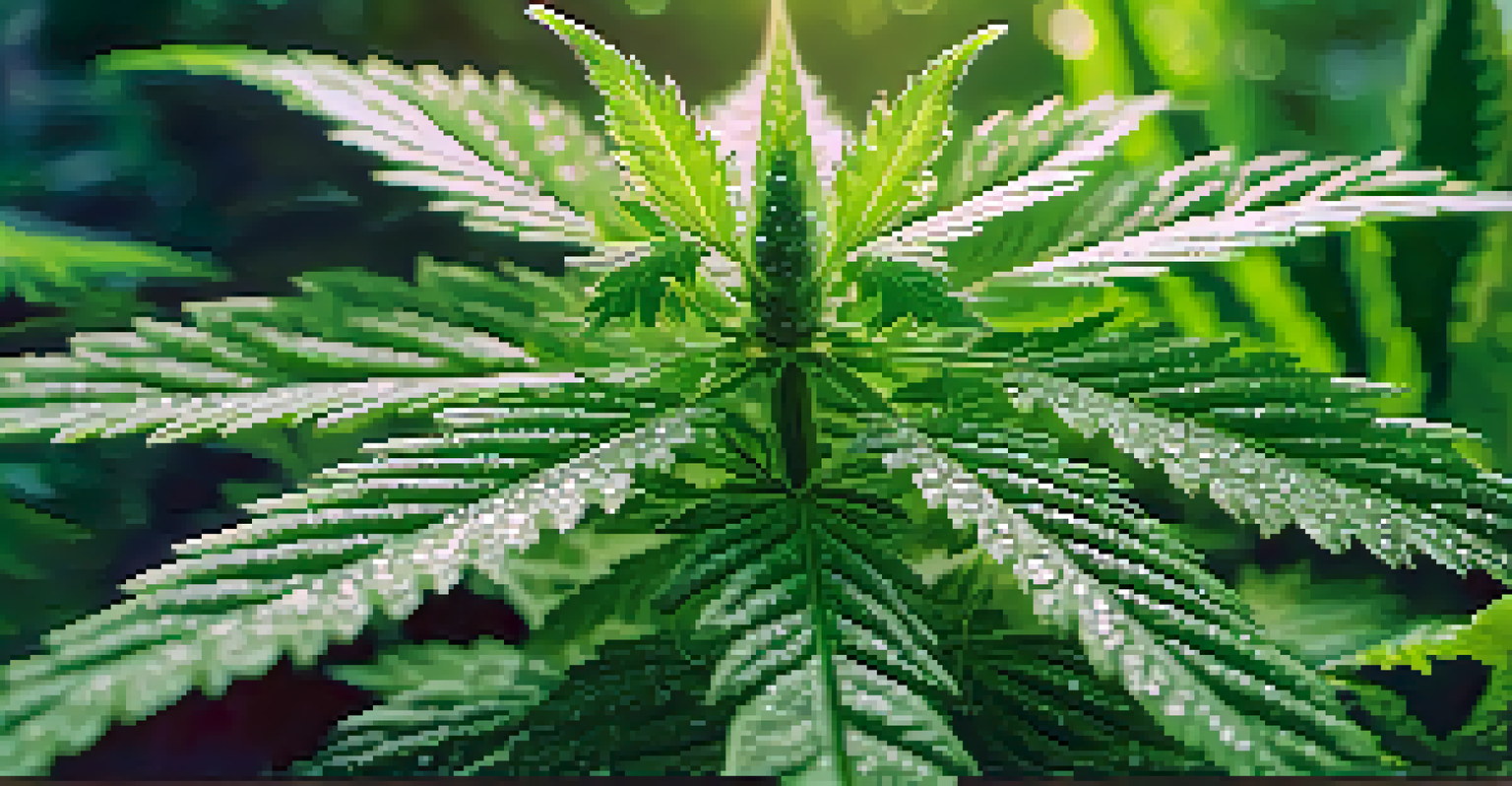The Neuroscience of Marijuana Addiction: What's Happening in the Brain

What Is Marijuana Addiction and Why Does It Matter?
Marijuana addiction, often referred to as cannabis use disorder, is a condition where individuals develop a dependence on the drug. Unlike occasional users who may consume marijuana without any issues, those struggling with addiction find it challenging to stop despite negative consequences. This distinction is crucial as it helps us understand the varying effects of marijuana on different people.
Addiction is not just about the substance; it's about the individual’s relationship with it.
The importance of recognizing marijuana addiction lies in its potential impact on mental health and daily functioning. It can lead to increased anxiety, depression, and a decline in social or work-related responsibilities. For many, understanding that marijuana can be addictive is the first step towards seeking help and making informed choices.
As public perception of marijuana shifts with legalization efforts, it’s vital to maintain a clear view of its risks. Just as alcohol or any other substance can lead to addiction, marijuana poses its own unique challenges, particularly for vulnerable populations. By educating ourselves on the neuroscience behind this addiction, we can better address its complexities.
The Brain's Reward System and Marijuana
To grasp the neuroscience of marijuana addiction, we must first understand the brain's reward system. This system is responsible for reinforcing behaviors by releasing dopamine, a neurotransmitter that brings feelings of pleasure. When marijuana is consumed, it triggers this system, leading to a heightened sense of euphoria, which can reinforce the behavior of using the drug.

However, repeated use of marijuana can alter the brain's natural reward pathways. Over time, the brain may require more of the substance to achieve the same pleasurable effects, leading to increased consumption. This cycle of dependency showcases how our biological systems can be hijacked by the substances we consume.
Understanding Marijuana Addiction
Marijuana addiction, or cannabis use disorder, affects individuals differently, leading to dependence despite negative consequences.
The relationship between marijuana and the brain's reward system illustrates why some individuals may develop addiction while others do not. Genetics, environment, and personal history all play a significant role in how one's brain responds to marijuana, emphasizing that the experience of addiction is uniquely personal.
Chemical Components of Marijuana: THC and CBD
Marijuana contains various compounds, but two of the most studied are THC (tetrahydrocannabinol) and CBD (cannabidiol). THC is the psychoactive component responsible for the 'high' users experience, while CBD is non-intoxicating and is often associated with therapeutic benefits. Understanding these components is essential in discussing addiction.
The greatest weapon against stress is our ability to choose one thought over another.
THC interacts with the brain's cannabinoid receptors, primarily in areas responsible for pleasure, memory, and coordination. This interaction can lead to the euphoric effects that many seek, but it also contributes to changes in brain function over time. Thus, frequent THC exposure can lead to alterations in how the brain processes rewards and memories, reinforcing addiction pathways.
On the other hand, CBD’s role is more complex and often seen as a counterbalance to THC. While CBD may help mitigate some negative effects of THC, it doesn't have the same addictive potential. This balance is significant for understanding why some users develop addiction while others find therapeutic value without dependence.
The Impact of Frequent Use on Brain Structure
Regular marijuana use can lead to notable changes in brain structure, particularly in areas like the hippocampus and prefrontal cortex. The hippocampus is crucial for memory formation, while the prefrontal cortex is involved in decision-making and impulse control. Changes in these regions can have profound effects on cognition and behavior.
Research has shown that chronic users may experience reduced volume in these brain areas, which can impair memory and increase impulsive behavior. This alteration can make it harder for individuals to quit, as their ability to make rational decisions is compromised. Understanding these structural changes highlights the long-term consequences of addiction.
Role of Genetics in Addiction
Genetic variations significantly influence an individual's risk of developing marijuana addiction, highlighting the complex interplay of biology and environment.
Moreover, these brain structure changes can persist even after cessation of use, indicating a potential long-term impact of marijuana on the brain. This underscores the importance of addressing marijuana addiction early, as prolonged use may lead to irreversible changes that affect overall well-being.
Genetics and Individual Vulnerability to Addiction
Genetics play a significant role in determining an individual's susceptibility to marijuana addiction. Research suggests that certain genetic variations can influence how one metabolizes THC, affecting the likelihood of developing dependence. This genetic predisposition highlights why some individuals may struggle with addiction while others can use marijuana recreationally without issues.
Additionally, the interaction between genetics and environmental factors can further complicate addiction risk. For example, individuals with a family history of substance abuse may have a higher likelihood of developing cannabis use disorder. Understanding these genetic factors can inform prevention and treatment strategies.
This genetic lens provides insight into the complexities of addiction, emphasizing that it is not merely a matter of willpower. Recognizing the biological underpinnings of marijuana addiction can foster empathy and support for those struggling, rather than stigmatization.
Psychological Factors That Contribute to Addiction
Psychological factors such as stress, trauma, and underlying mental health disorders can significantly influence the likelihood of developing marijuana addiction. Many individuals may use marijuana as a coping mechanism to deal with anxiety, depression, or past trauma, creating a cycle of dependence. This highlights the importance of addressing mental health in discussions of addiction.
When marijuana is used to manage psychological distress, it can create a false sense of relief, reinforcing the behavior over time. As individuals become reliant on marijuana to cope, their brain chemistry may adapt, leading to increased tolerance and dependence. This underscores the need for holistic treatment approaches that address both psychological and physical aspects of addiction.
Treatment Options Available
Effective treatment for marijuana addiction often combines behavioral therapies, counseling, and support groups to foster recovery.
Recognizing the interplay between psychological factors and marijuana use is crucial for treatment. Mental health support, therapy, and alternative coping strategies can provide individuals with healthier ways to manage their emotions and reduce their reliance on substances.
Treatment Options for Marijuana Addiction
Treatment for marijuana addiction often involves a combination of behavioral therapies, counseling, and support groups. Cognitive-behavioral therapy (CBT) is one effective approach that helps individuals understand the triggers and patterns associated with their use. By identifying these patterns, individuals can develop healthier coping mechanisms.
Support groups, such as Marijuana Anonymous, provide a community for individuals seeking recovery. Sharing experiences and challenges with others who understand can empower individuals on their journey to sobriety. These social connections are vital in overcoming feelings of isolation that often accompany addiction.

Additionally, ongoing research into pharmacological treatments may provide future options for those struggling with marijuana addiction. While no specific medication is currently approved for this purpose, understanding the brain's chemistry may lead to innovative therapies that help individuals regain control over their use.